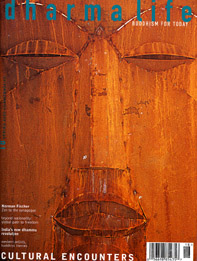Living at the Monastery, Working in the Kitchen
Poems by Eric Paul Shaffer
Leaping Dog Press 2001; $12.95p/b (us only)
These 'textless translations' are Shaffer's own poetic evocation of the life of Shih-te - the T'ang Dynasty rogue poet, friend of Han-shan, and T'ien-t'ai monastery cook. Based on Shih-te's spirit and style, Shaffer offers a suitably irreverent sequence of poems that are at once playful and provocative. Both Han-shan and Shih-te are well known for their mockery of the monks, indeed of anyone displaying signs of artifice and pretension. These poems capture the cheeky challenges of those freed from the limitations of a formal structure yet still engaged with it. 'The solitary life of Cold Peak (Han-shan) proves /one may live long on the Edge of Heaven, /falling neither in /nor out.'
And self-mockery is never far away: 'I lie on steps before the kitchen door, / fart and scratch myself / like any Buddha.'
Padmakara
A Deeper Beauty
Buddhist Reflections on Everyday Life
Paramananda
Windhorse Publications 2002; £8.99/ $16.95p/b
Following his popular meditation guide Change Your Mind , Paramananda here offers further imaginative and anecdotal reflections for Buddhist practice in the sphere of daily life. He combines soulful sincerity with practical exercises. I enjoyed the emphasis on the suggestive rather than prescriptive mode of teaching, which is backed up with poetry from sources as diverse as Elizabeth Bishop, Miroslav Holub, Ryokan, E.E.Cummings and Rumi.
Each chapter has a rich balance of poetry, traditional and personal anecdote, practical clarification and suggested reflections. I particularly appreciated Paramananda's drawing out of Bishop's poem The Fish, his chapter on 'Romancing Death', and a challenging section on the pervasive delusion of 'the notion of an economically productive life as the rationale for life itself'. Padmakara
Timeless Simplicity
Creative Living in a Consumer Society
John Lane
Green Books 2001; £8.95/ $12.95p/b
This gem of a book is a lucid manifesto and plea for a creative frugality much needed in a world of techno-distraction, superficial entertainment and consumer blindness. In a style that coheres with its content, Lane offers a refreshing survey of the idea of voluntary simplicity. Avoiding the extreme of arid asceticism, Lane manages to communicate the richness and deep benefits of a radical simplicity that is 'a state of mind flying in the face of the dominant norm'. Backing up his arguments with historical and contemporary references from both eastern and western traditions, secular and religious, this is a manual of inspiring vision and practical encouragement. Timeless Simplicity restored my faith in the possibility of casting off the trends and complexities by which we are so bewildered. Read, act, simplify - the world needs this sort of imaginative generosity. Padmakara
Meditation for Life
Martine Batchelor
Frances Lincoln 2001; $22.95/ £14.99p/b
This glossy, coffee-table paperback is clearly and beautifully designed. Combining a book on meditation with photographs by Stephen Batchelor works well - as I let my eyes wander over the images, the teachings reverberate and link with an inner world of colours, shapes and intimations. The geometrically bold, almost abstract detail of a golden autumn leaf enhances the attitude of zestful 'enquiry' described by the writer. Nature photos work best for me here, whereas others, like a bird in a cupped hand, or details of bright green glassware, seem a bit obvious or unsubtle - too magazine-like.
Each chapter is divided into three - firstly, the introduction of a basic teaching; secondly, practical explanations of meditation and its application in daily life; thirdly, a guided meditation. The bite-size format and down-to-earth style (obviously grounded in Batchelor's own practice) makes the material easy to understand. Her guided meditations emphasise reflection, often offering checklists, perhaps to the detriment of advice for absorption. Her tendency to prescribe what a meditator should be doing ('Try to ... Do not ...') is a little unappealing. However, this mixture of teachings and practices from different traditions could interest open-minded practitioners of any path. Ratnadevi



